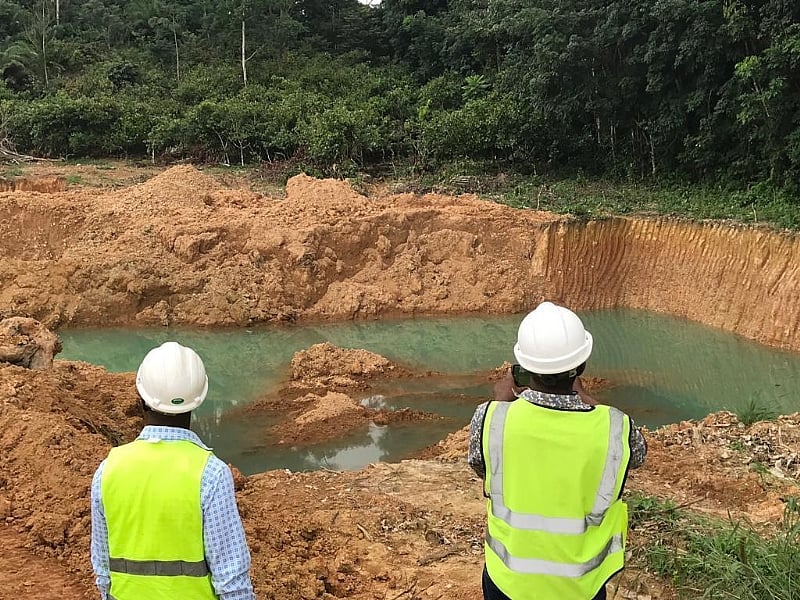The escalating cost of environmental rehabilitation in Ghana underscores the devastating impact of illegal mining activities, especially on the nation’s forest reserves. The Forestry Commission revealed that reclaiming just one hectare of mined-out land costs upwards of US$44,000, a figure that fluctuates depending on the severity of the damage. This significant financial burden highlights the long-term economic consequences of unsustainable mining practices. A pilot reclamation project, funded by the World Bank through the Global Partnership for Sustainability (GPS), has successfully rehabilitated 111 hectares of degraded land, providing a glimmer of hope for the restoration of Ghana’s ravaged ecosystems. However, the sheer scale of the devastation emphasizes the urgent need for more comprehensive and sustainable solutions. The variability in reclamation costs reflects the diverse nature of the environmental damage caused by illegal mining, with some areas requiring far more extensive intervention than others.
The Ghana National Landscape Forum, held in Accra under the theme “Natural Resource Management and Forest Economy for Inclusive Growth,” served as a crucial platform for stakeholders to grapple with the multifaceted challenges posed by illegal mining, locally known as “galamsey.” The forum brought together leading experts in natural resource management, representatives from government agencies, development partners, and civil society organizations to share insights, propose solutions, and forge a collaborative approach to environmental preservation. Recognizing the urgency of the situation, the participants emphasized the importance of balancing the country’s economic needs with the imperative of ecological protection. The forum’s focus on integrated natural resource management underscored the interconnectedness of environmental, social, and economic well-being, emphasizing the need for holistic strategies that address the root causes of environmental degradation.
The alarming extent of the damage inflicted by illegal mining on Ghana’s natural resources was a central theme of the forum. Yusif Sulemana, the Deputy Minister of Lands and Natural Resources, painted a stark picture of the environmental crisis, highlighting the widespread deforestation, water pollution, and biodiversity loss that have resulted from unregulated mining activities. He emphasized the devastating impact of galamsey on communities, where once-lush forests have been transformed into barren wastelands and rivers contaminated with toxic sediments. The Minister also acknowledged the serious threats posed by these destructive practices to food security and public health, underscoring the urgent need for effective interventions to mitigate the damage and restore ecological balance.
The government’s ongoing efforts to combat illegal mining were also discussed at the forum. Mr. Sulemana outlined a range of strategies being implemented, including the reform of the small-scale mining licensing regime, the decentralization of licensing processes to enhance transparency, and strengthened law enforcement efforts in collaboration with the military. The confiscation of over 100 excavators and other mining equipment, coupled with the arrest of more than 70 offenders between February and March 2025, demonstrates the government’s commitment to enforcing regulations and holding perpetrators accountable. However, the scale of the challenge requires sustained and collaborative action involving all stakeholders.
Beyond law enforcement, the government is also prioritizing community engagement and collaboration as crucial elements of its anti-galamsey strategy. Recognizing the importance of local ownership in achieving sustainable solutions, the Ministry of Lands and Natural Resources is working closely with communities, traditional leaders, and civil society organizations to foster a shared responsibility for environmental protection. This collaborative approach aims to empower local communities to actively participate in the fight against illegal mining and contribute to the long-term preservation of their natural resources. By fostering a sense of ownership and responsibility, the government hopes to create a more sustainable and effective framework for combating galamsey.
The reclamation of seven out of nine forest reserves previously overtaken by illegal miners represents a significant achievement in the fight against environmental degradation. This success underscores the potential for restoration and recovery when concerted efforts are made to address the root causes of the problem. However, the ongoing challenges posed by illegal mining highlight the need for vigilance and continued investment in sustainable solutions. The forum’s discussions underscored the importance of a multi-pronged approach that combines effective law enforcement, sustainable land management practices, community engagement, and economic diversification to address the complex issues associated with galamsey and ensure the long-term health of Ghana’s ecosystems. The high cost of land reclamation further emphasizes the economic benefits of preventing environmental damage in the first place, highlighting the need for proactive measures that prioritize sustainable development and responsible resource management.


